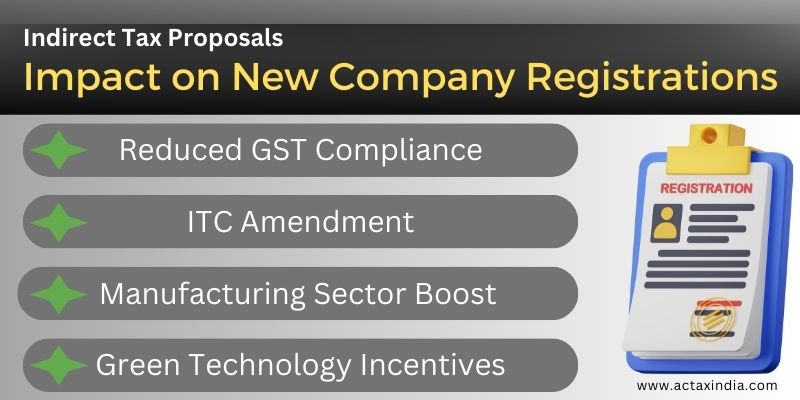Have you ever considered how the new 2024 budget could affect the rate of new company registrations in India? It’s a unique topic, especially for those planning to register a startup in India.
Even though the new budget hasn’t directly changed the company registration process, it has indirectly influenced the process based on the current Indian socio-economic landscape. This blog will specifically discuss its impact on the new company registration process.
Table of Contents
Has the Budget 2024 Indirectly Impacted the New Company Registration Process?
While there’s no direct impact on new company registration, the budget changes have had some indirect effects. A critical analysis of the same has been done in the section hereunder.
Impact of the Direct Tax Proposals (Budget 2024) on New Company Registration Processes

Abolishment of Angel Tax Encouraged New Startups
Section 56(2)(viib) of the Income Tax Act governed angel tax, which taxed the issued shares above the fair market value. The budget 2024 pleaded for the removal of angel taxes as a whole, which has the potential to significantly benefit the startups, as it acted as an entry barrier for them.
Removing the section can dramatically encourage the new company registration process as it will motivate the startups to register more in India.
Reduced Financial & Compliance Burden During Registration Process
The budget 2024 has increased the standard deduction for ‘salaried individuals’ from ₹50,000 to ₹75,000. Upon that, the family pension deduction increased from ₹15,000 to ₹25,000.
Apart from that, the removal of the indexation benefits from capital gains taxation, altogether, has led to lower tax liabilities for Indian companies.
In general, reduced TDS rates and lessened capital gains tend to significantly take off the compliance burden from businesses in the finance segment, thereby driving more startup registrations, especially after the 2024 Budget, now more than ever.
Increased Chances of Foreign Investment for New Businesses
The Budget 2024 proposed the reduction of corporate taxes on ‘foreign companies’ functioning in India to 35% from 40%. This can somewhat influence foreign entities to register their businesses in India.
Based on this possibility, the new company registration process can also be affected, as more foreign registrations can push a new set of rules in the Indian company registration process.
Reintroduction of Vivaad Se Vishwas Scheme
The Vivaad se Vishwas Scheme has been reintroduced again in the Budget 2024. The relevant reintroduction aimed at facilitating dispute settlement governing income tax, to eliminate litigation as much as possible.
This can drive more company registrations in India, as the scheme has the potential to dilute the legal environment of the corporate section.
The relevant reintroduction can further bring about a new company registration process, guided by some new precedent paved by the Vivaad se Vishwas Scheme.
Impact of the Indirect Tax Proposals (Budget 2024) on New Company Registration Processes

Encouragement of Reduced GST Compliance Burden
The reduced GST compliances directly impacted the post-registration processes of company formation. The ITC amendment allowing claims on debit notes and/or invoices from FY 2017-18 to 2020-21 can positively impact the companies that were unable to claim ITC before the passage of Budget 2024.
The introduction of CGST Section 74A was made to address the various tax discrepancies from short-paid/unpaid taxes to wrongfully availed GST/false refunds. This eventually pushed the corporate sector towards stricter compliance, thereby burdening them.
Moreover, the amendments in Sections 73 and 74 further constricted GST compliance for the corporate world (especially the businesses with pending tax liabilities). The GST registration process can also be impacted due to this.
Driving Force Behind Company Registration in the Manufacturing Sector
Exemptions and reduction of customs duties in the manufacturing sector (e.g., mobile phones, chargers, cancer drugs, gold, silver, platinum) have significantly benefited the sector and the companies within these sectors as a whole.
Unregistered startups from these following areas can be influenced by such changes, and decide to opt for it.
Duty Exemptions for Green Technologies Pushing the Corporates
The Budget 2024 further exempted goods like “alkali or alkaline earth metals, 25 rare earth minerals” and “capital goods for manufacturing of solar panels”.
This can significantly encourage investment in green technologies. The increasing usage of green technologies in the corporate sector can push new amendments in the new company registration process, especially post-registration (like taxes, stamp duties, etc.).
Impact of Sectoral Upgradations (Budget 2024) on New Company Registration Processes
Growth in the Agro-Based Industries
The agro-based industries can grow significantly backed by the Budget 2024 updates on provisions allowing ₹1.52 lakh crore for agriculture and allied sectors.
This can drive company registrations in the sector of agriculture, which in turn, can influence changes in the new company registration process (more because agro-based companies might function a little differently than the mainstream corporate sector).
Growth in the Agro-Based Industries
Budget 2024 further pushed the enactment of provisions regarding the development and upgradation of industrial parks and e-commerce hubs, which also has the potential to drive severe industrialization (i.e., more company registrations).
Although Not Direct, The Company Registration Process Was Affected!
While the Budget 2024 has not directly impacted the new company registration process, its indirect impact is undeniable. The post-registration processes were impacted severely, starting from GST compliances to direct tax compliances.
Furthermore, the abolishment of angel tax and reduction of financial regulatory burdens can be deemed to be a motivating factor for unregistered startups to get their business started now.
Apart from that, positive provisions regarding the manufacturing sector and the agriculture sector can push the registration of new businesses in those sectors.
Lastly, the Vivaad se Vishwas Scheme and green technology exemptions can set out new rules in the company registration process, if the MCA deems fit so.






